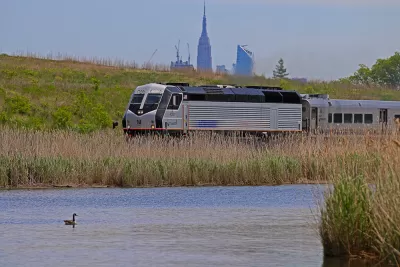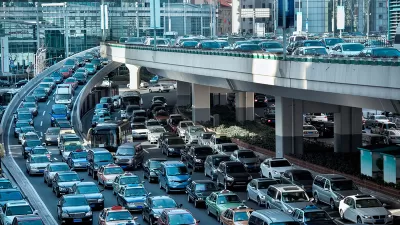Shifting commute patterns and the popularity of remote work could pose an existential threat to the New York City region's commuter rail services.

As reported by Matthew Haag and Patrick McGeehan, New York City's commuter rail services are continuing to experience drastically reduced ridership as the five-day office workweek seems increasingly obsolete. "In 2019, the regional transit agencies collectively carried more than 500 million passengers across the New York area, but ridership in 2021 declined by more than half of that prepandemic level." According to the MTA, the agency collected only $49 million in fares in 2021, down from $346 million in 2019.
The authors note that sales of monthly passes on commuter rail are down by 75 percent, leading to a dramatic drop in revenue despite optimistic projections from transit agencies. "Even as transit officials insist that the commuter railroads will start bouncing back in notable numbers this year, the agency is also acknowledging that the pandemic is more and more likely to lead to permanent changes in the region’s commuting pattern."
The agency has approved discounted passes to incentivize riders, but many former commuters show little interest in returning to hours-long commutes and passes that cost upward of $300. The article quotes Phil Pescatore, chief ethics officer at Guardian Life Insurance Company of America, who used to commute into the city from New Jersey. "'It’s been found time, and I have repurposed that time,' Mr. Pescatore said. 'I do things that I hadn’t had a chance to do: a bit more exercise in the morning, and the ability to think and plan a little bit more.'"
FULL STORY: How Remote Work Is Devastating New York City’s Commuter Rails

Planetizen Federal Action Tracker
A weekly monitor of how Trump’s orders and actions are impacting planners and planning in America.

Map: Where Senate Republicans Want to Sell Your Public Lands
For public land advocates, the Senate Republicans’ proposal to sell millions of acres of public land in the West is “the biggest fight of their careers.”

Restaurant Patios Were a Pandemic Win — Why Were They so Hard to Keep?
Social distancing requirements and changes in travel patterns prompted cities to pilot new uses for street and sidewalk space. Then it got complicated.

Platform Pilsner: Vancouver Transit Agency Releases... a Beer?
TransLink will receive a portion of every sale of the four-pack.

Toronto Weighs Cheaper Transit, Parking Hikes for Major Events
Special event rates would take effect during large festivals, sports games and concerts to ‘discourage driving, manage congestion and free up space for transit.”

Berlin to Consider Car-Free Zone Larger Than Manhattan
The area bound by the 22-mile Ringbahn would still allow 12 uses of a private automobile per year per person, and several other exemptions.
Urban Design for Planners 1: Software Tools
This six-course series explores essential urban design concepts using open source software and equips planners with the tools they need to participate fully in the urban design process.
Planning for Universal Design
Learn the tools for implementing Universal Design in planning regulations.
Heyer Gruel & Associates PA
JM Goldson LLC
Custer County Colorado
City of Camden Redevelopment Agency
City of Astoria
Transportation Research & Education Center (TREC) at Portland State University
Camden Redevelopment Agency
City of Claremont
Municipality of Princeton (NJ)




























